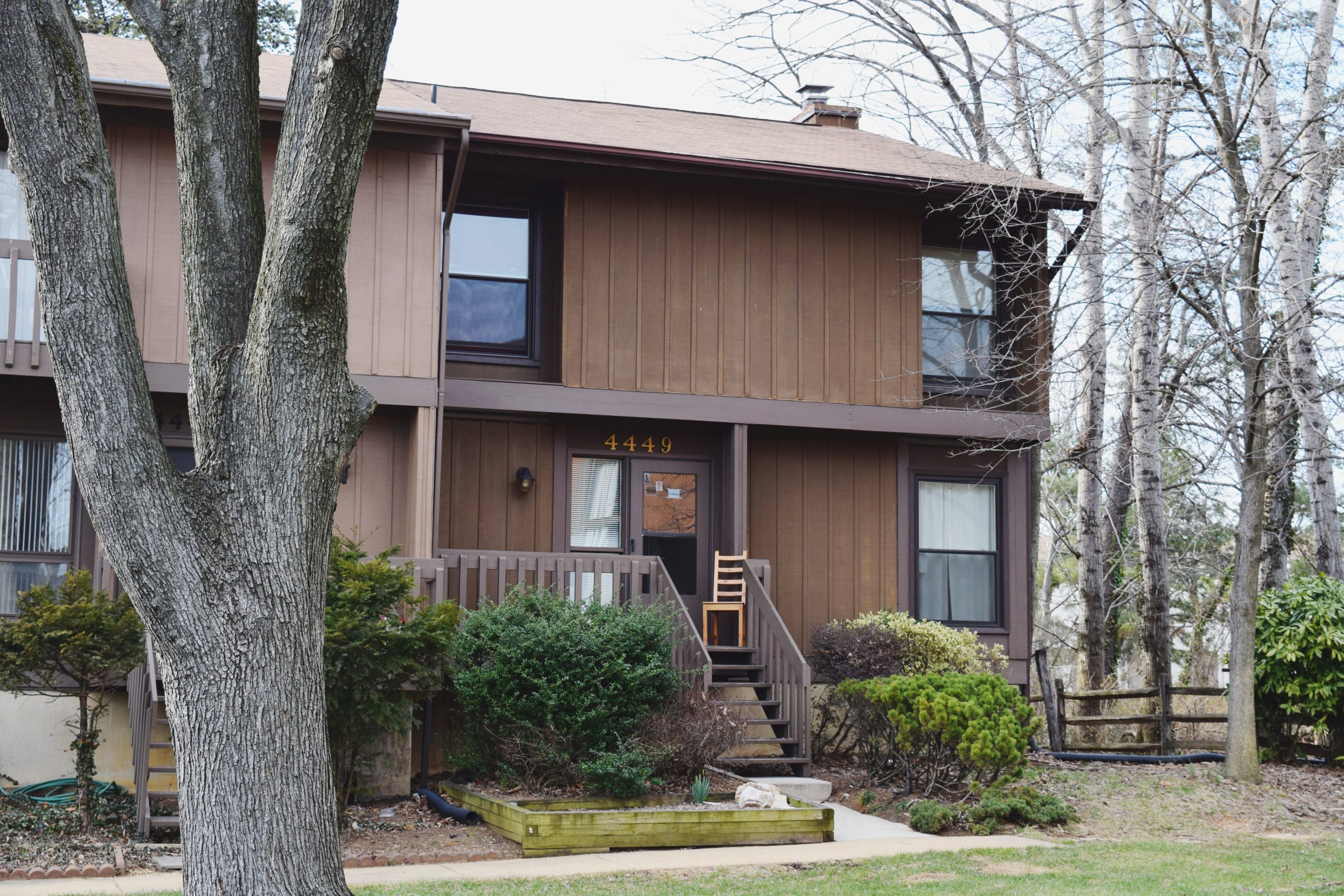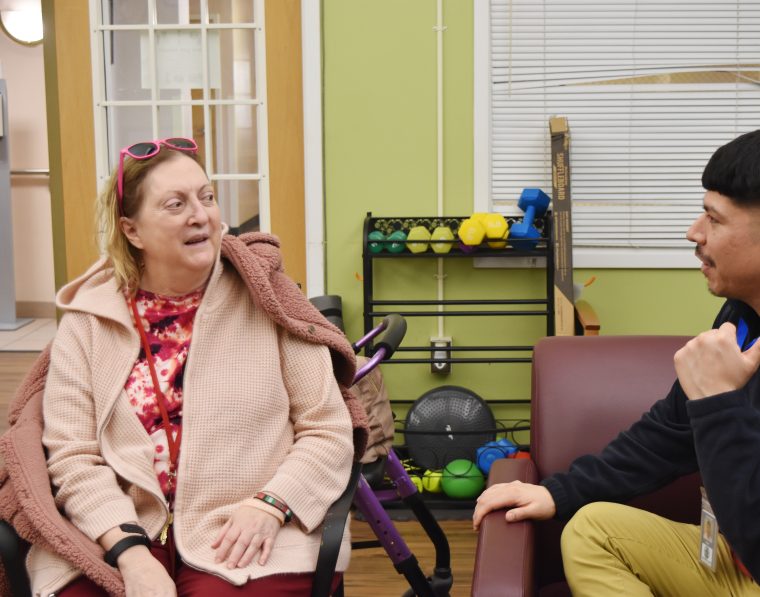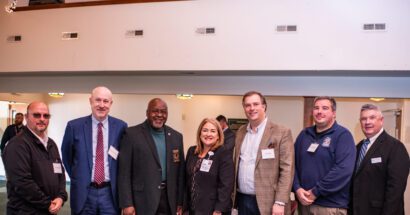How a Sentara Cares grant is helping Pathway Homes provide long-term housing and support

A grant from Sentara supports the Pathway Homes “Good Neighbor” fund, providing maintenance and renovations for six homes and 12 families.
For many of the people served by Pathway Homes, just having a front door to lock is life-changing.
“One of our community members who had experienced years of homelessness and trauma simply stood at her new front door and locked and unlocked it over and over again,” shares Pathway Homes Executive Vice President and COO Eleanor Vincent. “It was the first time she felt safe. That door represented control, security and a new beginning.”
Pathway Homes is a nonprofit organization that provides non-time-limited housing and supportive services to adults with serious mental illness and other co-occurring disabilities in Northern Virginia and Washington, D.C. With the support of a Sentara Cares grant, the organization is continuing its mission to provide safe, affordable homes along with the critical support services people need to stay housed long term.
“A home is the best first step for people with mental health struggles as they transition back to healthy, productive lives,” says Dr. Sylisa Lambert-Woodard, CEO of Pathway Homes. “Sentara’ grant helps us care for the homes that welcome these residents.”
Beyond shelter: Support that sustains success
“The number one step for us is getting people into housing,” says Vincent. “For someone who has been unhoused or cycling through hospitals, housing becomes the foundation for everything else—health, employment, reconnection with family. It all starts with a home.”
But finding a home is only the beginning. For many individuals arriving at Pathway Homes, the journey begins with no income, no job and no familiarity with how to access the services they’re eligible for. Pathway Homes offers comprehensive support services to help residents rebuild their lives. These services are tailored to meet each resident’s unique circumstances, with a flexible approach that evolves in response to their changing needs.
In addition to meeting their immediate needs, Pathway Homes clients also receive long-term supportive services to help them maintain their stability. These services include psychoeducation, daily living skills education, social skills education, medication management, job readiness, links to community services and self-advocacy support.
“Our residents often don’t understand how to navigate the system,” says Vincent. “We help them understand community norms, find grocery stores and food banks, get connected with local healthcare providers, and walk them step by step through applying for benefits like Social Security.”
That early guidance lays the groundwork for greater independence. Once individuals feel stable and secure, many express a desire to pursue employment, volunteer work or creative passions. Others begin focusing on long-term sobriety or learning the skills needed to manage their physical and mental health.
“Suddenly they’re ready to do the ‘life things’ they never had the chance to do before,” Vincent explains.
But not every journey is linear. Some residents discover that independent living may not be sustainable long-term due to physical or mental health needs. In these cases, Pathway Homes ensures a seamless transition to more intensive support—whether that means a nursing facility, assisted living or other care—with what Vincent calls a “warm handoff.”
“No matter where they are in their journey, we walk alongside them,” she says. “That continuity of care is what makes long-term stability possible.”
Sentara grant supports home maintenance and renovation
Pathway Homes currently owns and manages 135 scattered-site homes across Fairfax and Prince William counties, in addition to leasing another 391 housing units. Many of the individuals they serve were formerly homeless or recently discharged from psychiatric hospitals.
The Sentara grant supports their “Good Neighbor” fund, which covers essential maintenance, repairs, accessibility upgrades, and property renovations. The grant contributed to Pathway’s repair of six properties last year, helping 12 clients move into safe, well-maintained homes.
One resident shares, “I feel very comfortable in my home. A home should be your sanctuary.”
“When you’re in a space that feels good, you feel good in return,” says Vincent. “The funds from Sentara help us create and sustain those spaces.”
These funds also enable Pathway Homes to install features that support aging in place and mobility assistance as residents age.
“We’re seeing people stay with us longer, and their needs change. The Good Neighbor Fund helps us adapt right along with them,” she adds.
Housing stability that lasts
The impact of Pathway Homes’ model is clear: on average, 95% of residents remain in stable housing, and 95% avoid psychiatric hospitalization.
“Many of the people we serve have lost relationships, support networks, and even their sense of self,” says Vincent. “But with a safe place to live and someone walking beside them, they begin to recover.”
The program helps launch community members back into society with the tools to help some of them reconnect with family, regain custody of children, or go back to school.
“One of our board members even began her journey with us as a client—today she holds a master’s degree and gives back by serving on our board,” Vincent shares proudly.
From art exhibits that showcase client creativity to peer support programs where former clients now mentor others, Pathway Homes is more than a housing provider—it’s a community lifting one another up.
The ‘sauce’ that holds it all together
“I like to say our supportive services are the sauce in the lasagna,” Vincent says with a smile. “We layer all the ingredients that help folks, like affordable housing, community investment and public-private support. But supportive care is the ‘sauce’ that holds it all together.”
Thanks to Sentara’s investment, that ‘sauce’ is reaching even more residents, helping them not only open a door to a new home but also to an improved life.

Sherril, a Pathway Homes resident, speaks to a Resident Support Specialist.
Learn more about homelessness in the U.S.
Homelessness is a complex issue with many facets and contributing factors, including:
- Lack of affordable housing
- Unemployment and low wages with rising costs
- Mental illnesses and co-occurring disabilities
- Addiction and substance use
- Systemic racism and inequity
- Health issues that prevent a person from working, along with medical bills
- Victims of Domestic Violence
- Veterans suffering from PTSD
- Young adults formerly in foster care or juvenile detention
- Incarcerated individuals facing re-entry barriers to housing and jobs
- Immigrants with limited English proficiency


